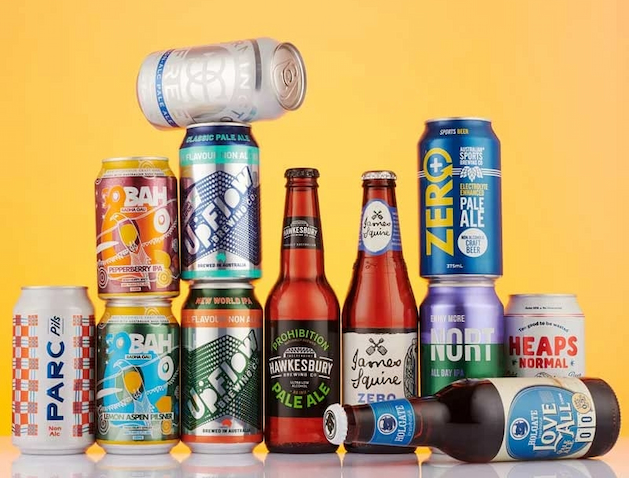You already know that alcohol is bad for you. The calories, the hangovers, and the list of negative side effects are seemingly endless. Choosing to have an unhealthy relationship with alcohol can have a negative impact on your overall physical and emotional health. However, if you just can’t give up on gin that easily, there are some tips to enjoy the richness and flavour of your gin without the negative side effects that alcohol comes with.
What Exactly are Non-alcoholic Drinks

Non-alcoholic beverages have been generating a stir in the drinks industry, mostly due to their health-conscious, booze-free options. They have piqued the interest of customers, buyers, and bartenders while also provoking some concern in the spirit sector. The popularity of alcohol-free spirits and this public’s interest are only expected to climb more in the future, and it is easy to see why.
An alcohol-free or non-alcoholic drink is a type of drink made without alcohol, or with the alcohol reduced to virtually nothing. The drinks in the alcohol-free category usually include products of beer, wine, ciders, and even spirits such as gin, whiskey, or rum that do not contain alcohol but carry the taste that customers know and enjoy. The drinks alcohol-free department includes a unique selection of healthy non-alcoholic spirits to compliment any occasion of yours, all of which are prepared with sugar-free, calorie-free, and vegan-friendly ingredients.
Alcohol is a flavour carrier, which is why alcohol free drinks often have a legally permissible low alcohol concentration of no more than 0.5 per cent ABV. Some non-alcoholic spirits are made in the same way that low-ABV spirits are: a neutral grain spirit and botanicals are added to a still, which is subsequently distilled many times to remove all of the alcohol from the liquid. There are those don’t use any base spirit at all, and instead they rely on maceration. This is a process in which botanicals are allowed to soak in a liquid until they create a flavour akin to the original alcoholic drink.
Benefits of Giving up Alcohol

There are countless health risks and concerns when it comes to consuming alcohol. From horrible hangovers to accidentally overdrinking and losing control, there are endless health risks and risks in general when it comes to using alcohol. Especially if you are a heavy drinker.
When you switch to alcohol free drinks, you can notice a big difference in your body. This is mostly because you have chosen a healthier option, one that respects your body and does not have the same effect on you like a drink with a high ABV.
You may find a better sleeping pattern, increased liver function, improved hydration, and better mental wellness. We are all aware of the detrimental consequences of alcohol on our bodies, so why not make the move to a better and healthier drink alternative. Some of the benefits you can expect to reap include:
Better Sleep
Alcohol also has an effect on the function of your nervous system. It can initially reduce your breathing and lower your heart rate and blood pressure. This might make you tired and lead you to fall asleep quickly. However, when your liver begins to metabolize the alcohol in your bloodstream, your heart rate and blood pressure rise, preventing you from falling asleep deeply. Your blood pressure and heart rate can stay stable while you sleep if your central nervous system is not disrupted.
Healthier Lifestyle

When it comes to breaking down alcohol, our liver does most of the job. As a result, it should come as no surprise that excessive drinking might result in liver disorders. Alcohol can damage your liver function over time and lead to health conditions like fatty liver disease or liver damage. Fortunately, your liver has the ability to restore itself in many cases. Before serious damage is done, it is important to take precautions to keep your liver healthy. This includes limiting your alcohol.
Reduced alcohol consumption not only keeps your liver alive, but it lowers your blood pressure and heart rate, reducing your risk of a variety of other heart-related health conditions. Excess alcohol consumption may elevate triglycerides, causing fat to accumulate in your arteries. This thickening and hardness of your artery walls can lead to major health problems like heart attacks, strokes, and irregular heart rhythm.
Better Nutrition
Drinking depletes your body of essential nutrients. Furthermore, many people with alcohol use disorder consume up to 50% of their total daily calories from alcohol, consuming less of the food required to feed their bodies with the necessary carbs, protein, fat, vitamins, and minerals.
The harmful impact of alcohol on the gastrointestinal system also encourages poor nutrition. Alcohol can even impair nutritional digestion, storage, usage, and excretion. The gut wall is irritated by alcohol, which causes inflammation and ulcers. This can lead to inadequate absorption of the nutrients and maldigestion. As a result, many heavy drinkers become malnourished.
Improved Immune System
We all know that a strong immune system is essential for fighting off any illness. In addition, alcohol has been found in studies to reduce our body’s natural defences when consumed in significant quantities. Alcohol can have an immediate and negative influence on your immune system, reducing its ability to fight pathogens. Alcohol can also impair your body’s ability to mend itself over time. So, if you choose to limit your alcohol intake, or at least do the switch with drinks alcohol-free, your immune system will begin to improve and strengthen, keeping you healthy.
Lower Calorie Intake
Alcohol is bad for your waistline since most alcoholic beverages are rich in calories and many are blended with juice or other sugar-laden liquids. Drinking alcohol might induce weight gain over time because your body processes it before other nutrients. Unused nutrients, like sugar, are converted to fat and stored in your body. Alcohol can also stimulate your appetite, causing you to eat more than usual. Reduced alcohol consumption can help you make better food choices and eliminate unnecessary calories and sugars from your diet.


